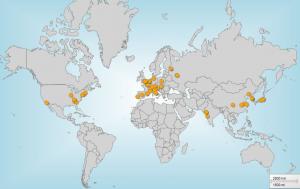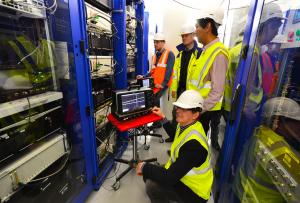The Sun never sets on the CODAC empire
18 Mar 2013
-
Robert Arnoux
With 55 organizations presently using the CODAC Core System, the Sun never sets on the CODAC empire...
Every year in February, when almond trees begin to bloom in Provence, the ITER CODAC team releases a new version of the CODAC Core System.
The 2013 edition (CODAC Core System v 4.0) is more robust, comes with a better operator interface, offers more features, and supports plant systems that need "fast control," for example plasma control systems that have to react within a strictly defined period of time. "Version 3.0 did it okay," says ITER Control System Division Head Anders Wallander. "Version 4.0 does it better."
CODAC (Control, Data Access and Communication) can be described as a software conductor that orchestrates the dialogue between the hundred-odd ITER plant systems ..."the system of systems that makes one entity of everything" ... the lingua franca that allows the magnets, blanket, tritium plant, cryostat and diagnostics to exchange signals and share information.
The core of the infrastructure is located in a technical room in the basement of ITER Headquarters. The software undergoes rigorous testing before release. Left to right: Xavier Mocquard, Anders Wallander, Changseung Kim and Petri Mäkijärvi.
Working for the ITER project here and abroad, 55 organizations (Domestic Agencies, fusion labs, contractors) are presently using the CODAC Core System. An infrastructure has been set up to distribute the software to these and future organizations and to keep track of versions used. Training and user support is also provided.
The software package has recently demonstrated its efficiency on the Korean tokamak KSTAR and celebrated its "First Plasma," so to speak, last June at the Frascati Tokamak Upgrade (FTU) project in Italy. "The ITER CODAC system is truly becoming a world language," says Anders.
CODAC is already implemented and deployed to monitor the power consumption on the ITER site, providing the "power people" with a global view and data with which to charge the different contractors operating on site. "With these pilot applications, we're demonstrating that the system meets our expectations," says CODAC System Engineer Franck Di Maio. "We're demonstrating the system's credibility."
CODAC users throughout the world are no different from any personal software user: switching to an upgrade is both exciting and challenging. "Although we provide support for older versions, we want to convince companies to upgrade. And the way to do it is to provide new features and make the upgrade easy." In Franck Di Maio's v 4.0 User Manual, the list of changes, fixed bugs, and enhancements of all kinds occupy no less than six pages ...
Optimizing, upgrading and adapting ITER CODAC is "a process that will never end," says Anders. "There will always be new requirements—this is the main difference between an experimental facility and a power plant."



